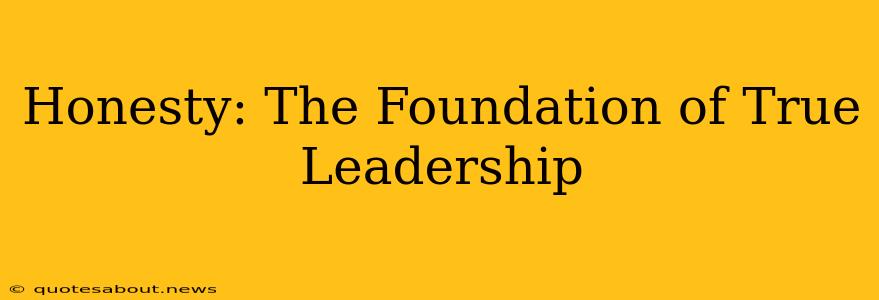Honesty is more than just telling the truth; it's the bedrock upon which true leadership is built. In a world often characterized by deception and self-serving agendas, honest leaders stand out, inspiring trust and fostering genuine connection with their teams and stakeholders. This isn't simply about avoiding lies; it's about cultivating a culture of transparency, integrity, and accountability. This article explores the vital role honesty plays in effective leadership, addressing common questions and misconceptions surrounding this crucial trait.
What are the benefits of honesty in leadership?
The benefits of honest leadership are multifaceted and far-reaching. When leaders consistently demonstrate honesty, they create an environment of trust. This trust fosters open communication, increased collaboration, and improved morale. Employees who trust their leaders are more likely to be engaged, productive, and committed to the organization's success. Furthermore, honesty enhances a company's reputation, attracting top talent and building stronger relationships with clients and partners. In the long run, an honest approach to leadership contributes to sustainable growth and success.
How can leaders cultivate honesty within their teams?
Cultivating honesty isn't a passive endeavor; it requires conscious effort and consistent reinforcement. Leaders must model the behavior they expect from their team members. This involves admitting mistakes, taking responsibility for actions, and being transparent in communication. Creating a safe space where employees feel comfortable speaking up, even when delivering challenging feedback, is crucial. Establishing clear ethical guidelines and implementing systems of accountability further strengthens the commitment to honesty. Regularly reinforcing the importance of honesty through training, recognition, and rewards solidifies its position as a core organizational value.
Is it always easy to be honest as a leader?
No, being honest as a leader is not always easy. Difficult conversations, delivering negative feedback, or admitting mistakes can be challenging. However, the long-term benefits significantly outweigh the short-term discomfort. Honest leaders demonstrate courage and integrity, qualities that inspire respect and admiration. Learning to navigate difficult conversations with empathy and clarity is an essential skill for any leader committed to honesty. Sometimes, difficult truths must be shared, even when they are unpopular. The impact of honesty, while initially challenging, ultimately builds stronger relationships and a more resilient team.
How does honesty impact employee morale and productivity?
Honesty directly correlates with increased employee morale and productivity. When employees trust their leaders and feel valued, they are more likely to be engaged and motivated. This translates into higher productivity, reduced employee turnover, and improved overall performance. A culture of honesty also promotes a sense of fairness and equity, reducing resentment and conflict within the team. Furthermore, employees are more likely to go the extra mile for a leader they perceive as honest and trustworthy. This translates to a more collaborative and innovative work environment.
Can dishonesty ever be justified in leadership?
No, dishonesty can never be truly justified in leadership. While difficult situations may require careful consideration and strategic communication, compromising one's integrity undermines trust and erodes the very foundation of effective leadership. Short-term gains achieved through dishonesty are invariably outweighed by the long-term damage to reputation and morale. Building trust requires unwavering commitment to truthfulness, even when it's challenging. A leader's reputation for honesty is their most valuable asset.
What are some examples of honest leadership?
Numerous historical and contemporary figures exemplify honest leadership. Leaders who openly acknowledge their shortcomings, take responsibility for mistakes, and consistently prioritize ethical conduct inspire trust and loyalty. For example, leaders who transparently communicate company performance, both positive and negative, build credibility and demonstrate a commitment to accountability. Similarly, leaders who foster open dialogue and actively solicit feedback showcase their commitment to honesty and transparency. These examples demonstrate that honesty isn't merely a personal quality; it's a strategic leadership approach that yields significant returns. By consistently acting with integrity, leaders create a culture of honesty that permeates every aspect of their organization.
Conclusion:
Honesty is not a mere desirable trait for leaders; it is a fundamental requirement. It’s the cornerstone of trust, the catalyst for collaboration, and the foundation for sustainable success. Leaders who prioritize honesty cultivate high-performing teams, build strong reputations, and ultimately achieve greater organizational impact. The journey towards honest leadership may present challenges, but the rewards are immeasurable.

